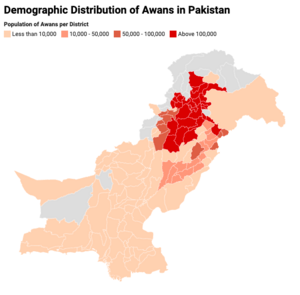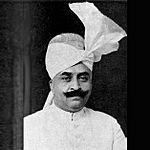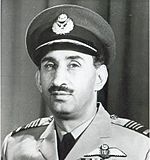Awan (tribe) facts for kids
The Awan (Urdu: اعوان) are a large group of people, or tribe, mainly living in Pakistani Punjab. You can find many Awan people in the northern, central, and western parts of this region. They also live in Khyber Pakhtunkhwa, Azad Kashmir, Sindh, and Pakistani Balochistan. Some Awan people also live in Afghanistan.
Awan History and Origins
The Awan people believe they are descendants of Ali ibn Abu Talib, an important figure in Islam. This connection to Arab origins gives them a respected place in the Muslim community of India and Pakistan.
Historian Christophe Jaffrelot describes the Awan as brave warriors and skilled farmers. They became very strong in parts of the Salt Range area. They also set up many communities along the Indus River all the way to Sindh. There was also a large Awan community near Lahore.
Awan people have a strong tradition of serving in the military. Many Awans have joined the Pakistani Army. During the time of British rule, they were seen as a "martial race." This meant they were considered excellent soldiers.
Genetic Studies on Awan People
Scientists have studied the genes of the Awan people. These studies were done by universities and institutes in Australia, Pakistan, and Russia. They found that the Awan people are genetically unique. This means their genes are different from nearby tribes like the Khattar and Rajput.
One study from Hazara University in Pakistan looked at DNA. It found a specific genetic marker, called haplogroup T1, only in Awans. This marker is thought to have started in Israel. This finding supports the idea that the Awan tribe might have Arab roots.
Another study also looked at the genetic makeup of people in Northern Pakistan. This research found a special genetic pattern in the Awan population. These studies help us understand the unique history of the Awan people.
Notable Awan People
- Nawab Malik Amir Mohammad Khan – He was the Nawab of Kalabagh. He was also the Chief of the Awan tribe. From 1960 to 1966, he served as the Governor of West Pakistan.
- Air Marshal Nur Khan – He was the Commander-in-Chief of the Pakistan Air Force from 1965 to 1969. He also served as Governor of West Pakistan. He received the Hilal-i-Jurat, a high military award in Pakistan.
- Mir Sultan Khan – He was a famous chess master. Many people believe he was one of the greatest natural chess players ever.
- Ahmad Nadeem Qasmi – He was a well-known Urdu poet, journalist, and writer. He won the Pride of Performance and Sitara-e-Imtiaz, which are high civilian awards in Pakistan.
- Sultan Bahu – He was a Sufi mystic and poet. He founded a mystic tradition called Sarwari Qadiri.
- Khadim Hussain Rizvi – He was a Pakistani Islamic scholar. He founded the political party Tehreek-e-Labbaik Pakistan.
- Ameer Muhammad Akram Awan – He was an Islamic scholar and spiritual leader. He led the mystic tradition known as Naqshbandia Owaisiah.
- Abdul Mannan Wazirabadi – He was an Islamic scholar and jurist. He was also an expert in Hadith.
- Dilip Kumar – He was a famous actor in Hindi cinema.
 | Dorothy Vaughan |
 | Charles Henry Turner |
 | Hildrus Poindexter |
 | Henry Cecil McBay |




